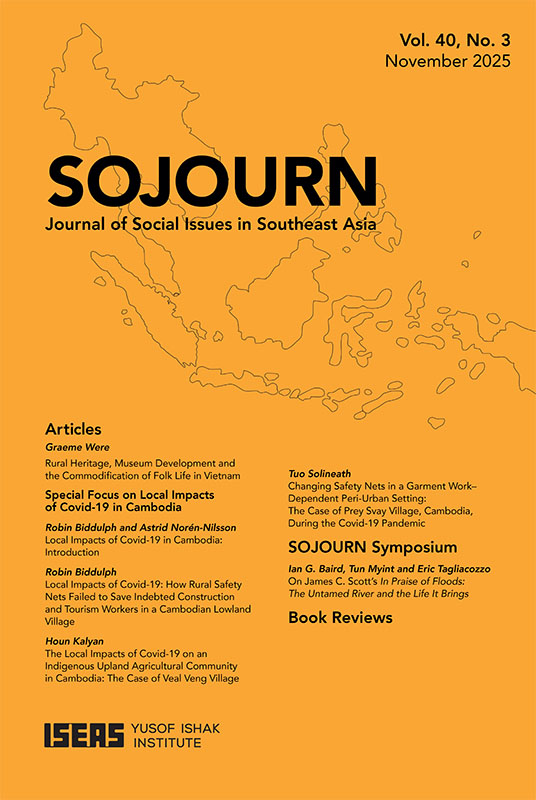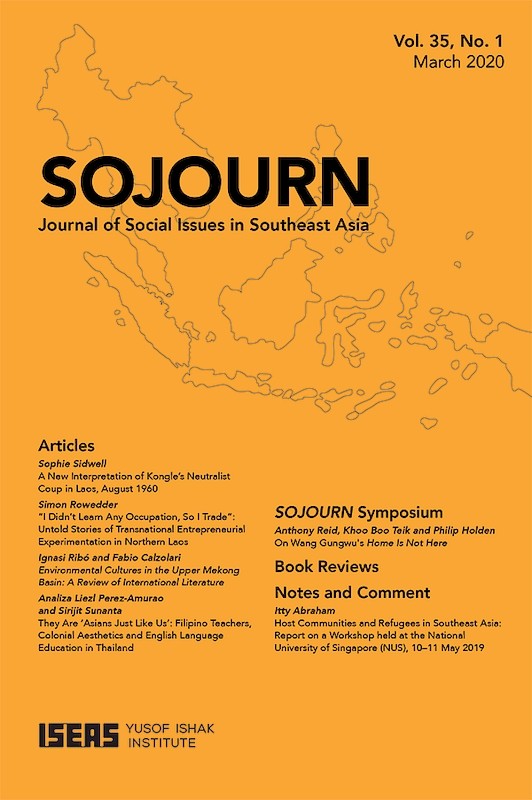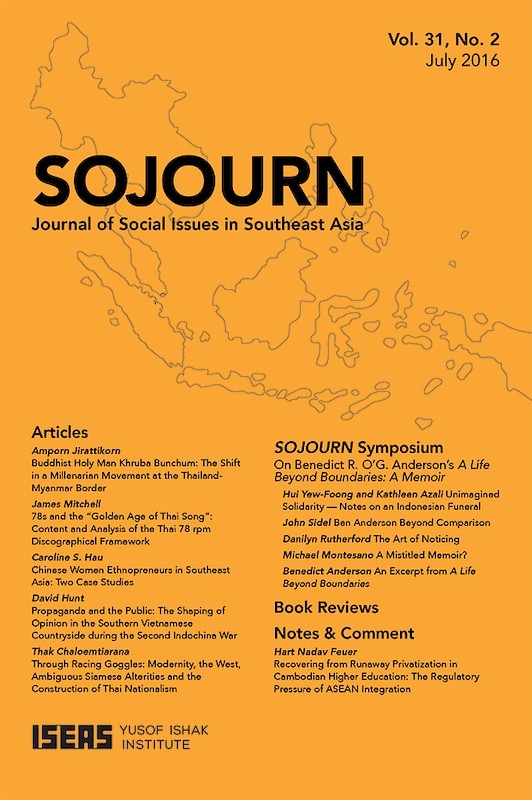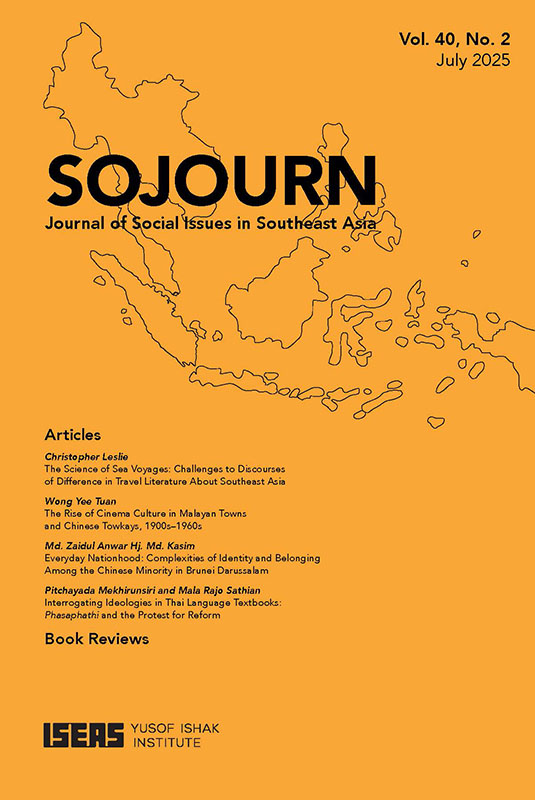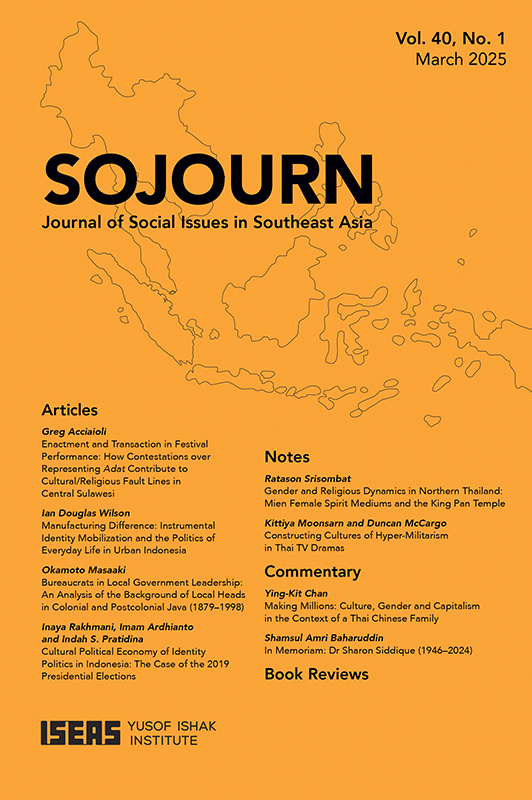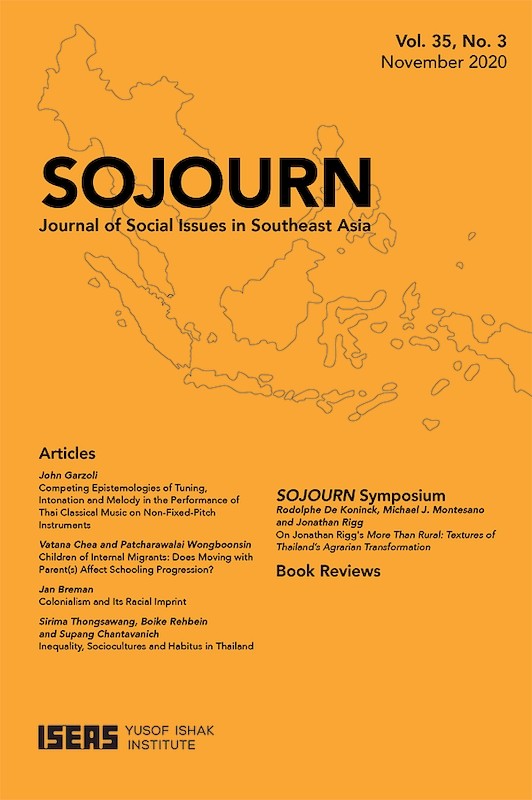SOJOURN: Journal of Social Issues in Southeast Asia Vol. 39/2 (July 2024)
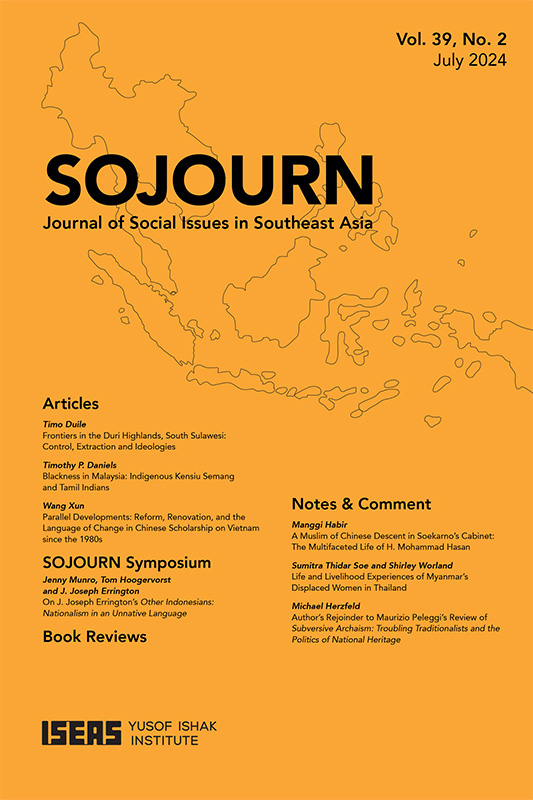
Date of publication:
July 2024
Publisher:
ISEAS – Yusof Ishak Institute
Number of pages:
166
Code:
SJ39/2
Soft Cover
ISSN: 02179520
Contents
-
SOJOURN: Journal of Social Issues in Southeast Asia Vol. 39/2 (July 2024)
[Whole Publication, ISSN: 17932858] -
Preliminary pages
- ARTICLES
-
Frontiers in the Duri Highlands, South Sulawesi: Control, Extraction and Ideologies, by Timo Duile, author see abstractThe Duri highlands in South Sulawesi have often been a contested frontier for resources, identities and political influence. This article discusses the issue of identities as ideologies within the framework of the political economies of the Duri highlands as a frontier region. It outlines different typologies of frontiers and explains how they have played a role in the history of the region. The article argues that the area was—and still should be—considered a frontier of extraction and of control. These frontiers formed in regard to different identities such as being Muslim, Indonesian or indigenous. Analysing more recent events, the article examines indigenous identity through which activists and local communities gain land titles. This process, it is argued, is of relevance in regard to the frontiers of control and extraction. The issue of indigenous land titles and the respective identities are the newest processes that shape the frontier, and while they discursively incorporate these areas into national development ideologies, they also make possible certain degrees of indigenous self-determination.
-
Blackness in Malaysia: Indigenous Kensiu Semang and Tamil Indians, by Timothy P Daniels , author see abstractBlackness in Malaysia is associated with Semang or “Negritos” and Indians, ranked groups based on a mix of biological and cultural attributes in colonial and postcolonial racial worldviews. They inhabited separate but lower rungs of “civilized” and “aboriginal” slots in colonial Malaya and are treated as second-class citizens in postcolonial Malaysia. Ethnographic accounts demonstrate their experiences of prejudice and discrimination in contemporary Malaysia. Kensiu Semang and Tamil Indian racial projects for improving their conditions interact with other racial projects serving different interests. The social and cultural configuration shapes their positive self-identities that are not rooted in Blackness.
-
Parallel Developments: Reform, Renovation, and the Language of Change in Chinese Scholarship on Vietnam since the 1980s, by Wang Xun, author see abstractAs one of China’s most significant neighbouring states, Vietnam has been a natural focus of Chinese scholars. This article analyses how Chinese scholars have interpreted changes in the Vietnamese political economy after 1975, usually characterized in English as a period of “reform” and “renovation” that created steady high economic growth in Vietnam. While Vietnamese reform has been positive, Chinese discourse on it has varied from criticizing it to using it as a reference point for Chinese reform. Although previous studies attributed these variations to fluctuating China-Vietnam relations, I argue that shifts in China’s domestic reforms also played a role.
- SOJOURN SYMPOSIUM
-
On Other Indonesians: Nationalism in an Unnative Language by J. Joseph Errington, by Jenny Munro, Tom Hoogervorst, J Joseph Errington, authors
- BOOK REVIEWS
-
BOOK REVIEW: Heritage and the Making of Political Legitimacy in Laos: The Past and Present of the Lao Nation by Phill Wilcox, by Rosalie Stolz, author
-
BOOK REVIEW: From Tribalism to Nationalism: The Anthropological Turn in Laos—A Tribute to Grant Evans, edited by Yves Goudineau and Vanina Bouté, by Hjorleifur Jonsson, author
-
BOOK REVIEW: Consumption and Vietnam’s New Middle Classes: Societal Transformations and Everyday Life by Arve Hansen, by Ivan V Small, author
-
BOOK REVIEW: Wayward Distractions: Ornament, Emotion, Zombies and the Study of Buddhism in Thailand by Justin Thomas McDaniel, by Erik W Davis, author
-
BOOK REVIEW: In the Shadow of the Palms: More-Than-Human Becomings in West Papua by Sophie Chao, by Orven Mallari, author
-
BOOK REVIEW: The Candidate’s Dilemma: Anticorruptionism and Money Politics in Indonesian Election Campaigns by Elisabeth Kramer, by Ahmad Khoirul Umam, author
-
BOOK REVIEW: Of Gods, Gifts and Ghosts: Spiritual Places in Urban Spaces by Terence Heng, by Orlando Woods, author
-
BOOK REVIEW: The Sovereign Trickster: Death and Laughter in the Age of Duterte by Vicente Rafael, by Vincent Pacheco, author
-
BOOK REVIEW: Riverine Border Practices: People’s Everyday Lives on the Thai-Lao Mekong Border by Thanachate Wisaijorn, by Nathan Badenoch, author
-
BOOK REVIEW: Why We Can’t Have Nice Things: Social Media’s Influence on Fashion, Ethics and Property by Minh-Ha T. Pham, by Jane M Ferguson, author
- NOTES & COMMENT
-
A Muslim of Chinese Descent in Soekarno’s Cabinet: The Multifaceted Life of H. Mohammad Hasan, by Manggi Habir, author see abstractThis research note traces the life of H. Mohammad Hasan, who was honoured posthumously in 1998 with the Bintang Mahaputra Adipradana—an award given in recognition of extraordinary contributions and loyalty to the country. Born in 1925 as Tan Kim Liong in Dutch colonial Borneo, Hasan settled after independence in Jakarta, where he became a photojournalist. His work and passion for chess led him to befriend several up-and-coming politicians, including those from the Nahdlatul Ulama (NU). Chosen as NU’s member of parliament in late 1956, he subsequently converted to Islam and adopted his Muslim name. As a cabinet minister during Soekarno’s final years, he introduced the country’s first tax amnesty programme to boost state revenues. Following the 1965 coup, Hasan moved to Hong Kong, where, in addition to engaging in business, he actively organized world chess tournaments. On returning to Indonesia in 1974, Hasan built Hasfarm, the country’s largest private cocoa plantation. Hasan’s multifaceted life journey ended in 1991 at the age of sixty-six.
-
Life and Livelihood Experiences of Myanmar’s Displaced Women in Thailand, by Sumitra Thidar Soe, Shirley Worland, authors see abstractThis research note presents the findings of a project aimed at understanding the life and livelihood experiences of displaced Myanmar women in Thailand. Since the 2021 Myanmar military coup, thousands of people, including women of diverse socio-economic backgrounds, have fled Myanmar to neighbouring Thailand, where they are living as undocumented refugees with restricted livelihood opportunities. The results show that, in displacement, the lived experiences of these women vary according to their status and backgrounds. What is common, however, is that the displacement experiences of these women begin from a position of loss. Thereafter, their trajectories differ in terms of the way they seek to overcome the challenges of displacement and the associated traumatic experiences.
-
Author’s Rejoinder to Maurizio Peleggi’s Review of Subversive Archaism: Troubling Traditionalists and the Politics of National Heritage, by Michael Herzfeld, author

